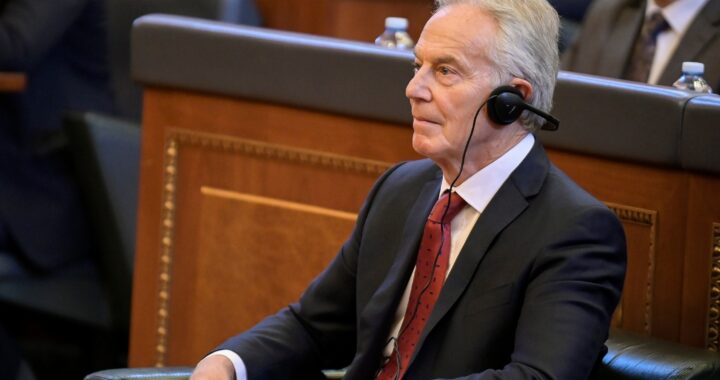

 British Ex-Prime Minister Tony Blair addresses Kosovo’s parliament on June 10, 2024. Photo: Kosovo parliament
British Ex-Prime Minister Tony Blair addresses Kosovo’s parliament on June 10, 2024. Photo: Kosovo parliament
As Kosovo marked the 25th anniversary of the war's end, Britain's ex-Prime Minister told MPs he was glad his country helped end 'oppression and injustice'.
Former UK Prime Minister Tony Blair received a warm welcome on Monday in Pristina, as Kosovo celebrated the 25th anniversary of its liberation. As Prime Minister of Britain, Blair was one of the most vocal supporters of NATO intervention in Kosovo in 1999.
On Monday, he met President Vjosa Osmani and walked to parliament to address MPs in a special session scheduled for his arrival.
“This day, June 10, 25 years ago, agreement was reached for a complete and non-conditional withdraw from the territory of Kosovo of the forces of invasion. Kosovo was finally free, its people able to live again, to hope again, to believe again in a future free of oppression and injustice,” Blair told MPs, referring to the Kumanovo agreement which ended NATO-led air strikes on Serbia and led to the withdrawal of Serbian forces from Kosovo in June 1999.
Blair recalled tense political negotiations in 1999 and his visits to camps of Kosovo refugees near Skopje, in Macedonia. “Meeting the Kosovo refugees at the camps near Skopje, hearing their heartbreaking stories of displacement and cruelty, of their faces desperate for help, seeking in my face some sense of whether I would or could help. We did help and I never regretted it,” he added.
Different state leaders, including Albania’s Prime Minister, Edi Rama, and former Italian Prime Minister Massimo D’Alema, also visited Kosovo on Monday, meeting leaders and participating at different events marking the liberation anniversary.
Glauk Konjufca, head of Kosovo’s parliament, praised Blair and other Western leaders for their engagement during the 1999 crisis. “Mobilisation and the engagement of the most democratic alliance in the world, NATO, stopped genocide in our country and allowed people’s freedom,” Konjufca said.
The Western alliance launched 78 days of air strikes in March 1999 to force Yugoslav President Slobodan Milosevic to accept the terms of an agreement to end his military campaign against the Kosovo Liberation Army, KLA, which involved widespread ethnic cleansing. Around 1 million of Kosovo Albanians fled during this time mainly to neighbouring Albania and Macedonia.
The Serbian government estimates that at least 2,500 people died and 12,500 were injured during the NATO campaign, although the exact death toll remains unclear. The Humanitarian Law Centre data says 756 people died during the NATO bombing campaign.
The air strikes, launched without the backing of a UN Security Council resolution and justified by NATO as a humanitarian intervention, ended on June 10, 1999 after Milosevic agreed to withdraw forces from Kosovo.
Kosovo declared independence in 2008 and has since been recognised by around 115 states, while Serbia has refused to recognise it.
10 June 2024 - 17:09

Kosovo PM Albin Kurti first came to power in a landslide win in 2021, ...

In Kosovo’s public discourse, early pregnancies are frequently portr...

A significant portion of the information consumed by the citizens of K...

Former intelligence agency chief Driton Gashi was sentenced to four ye...